New UN websites & publications
UN in General
General Assembly High-level Week 2023
English: https://www.un.org/en/high-level-week-2023
French: https://www.un.org/fr/high-level-week-2023
Spanish: https://www.un.org/es/high-level-week-2023
A web page dedicated to the United Nations General Assembly High-level Week has been developed in all official languages. This one-stop-shop provides useful information on key events during the high-level week of the 78th General Assembly: the General Debate, the SDG Summit, the Climate Ambition Summit, the High-level Dialogue on Financing for Development, the Preparatory Ministerial Meeting for the Summit of the Future, and the High-level Meetings on Pandemic Prevention, Preparedness and Response; Universal Health Care Coverage, and on the Fight against Tuberculosis. Each section will be updated as more information becomes available.

The 78th regular session of the General Assembly will open on 5 September 2023, the General Debate will commence on 19 September 2023.
Further information
Agenda of the 78th session
English: https://www.un.org/en/ga/78/agenda/
French: https://www.un.org/fr/ga/78/agenda/
Spanish: https://www.un.org/es/ga/78/agenda/
High-Level Meetings of the 78th Session of the General Assembly
English: https://www.un.org/en/ga/78/meetings/
French: https://www.un.org/fr/ga/78/meetings/
Spanish: https://www.un.org/es/ga/78/meetings/
Provisional Schedule
Additional information and modalities
A/78/1 – Report of the Secretary-General on the work of the Organization
English, French & Spanish: https://undocs.org/A/78/1
“Introduction: The past year was marked by increasingly complex crises for our world – poverty, inequality, hunger and rising unemployment; an uneven and uncertain global economic outlook; the escalating climate emergency; and conflicts, in particular the invasion of Ukraine by the Russian Federation. In every case, the poorest and most vulnerable people and communities are hit hardest. Meanwhile, human rights are under assault, worsened by widening economic and social gaps and the lingering effects of the coronavirus disease (COVID-19) pandemic. Women and young people continue to be shut out of economic, civic and social spaces, denying entire societies their contributions and ideas. Shrinking civic space, the rapid spread of mis- and disinformation and rising hate speech and misogyny are pushing people apart at a time when we need unity and solidarity more than ever. We face the highest levels of geopolitical mistrust and competition in decades. Sharp divisions are growing within countries and across the global comm unity. Countries and entire regions are turning their backs on one another, leaving the urgent and essential business of jointly shaping a better future to wither on the vine. …”
Our Common Agenda: Policy Brief 10: Transforming Education
English: https://www.un.org/sites/un2.un.org/files/our-common-agenda-policy-brief-transforming-education-en.pdf
A/77/CRP.1/ADD.9 in English, French & Spanish: https://undocs.org/A/77/CRP.1/ADD.9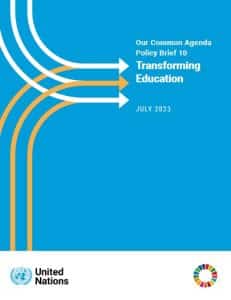
“Summary: The challenges that we are facing can be addressed only through stronger international cooperation. The Summit of the Future, to be held in 2024, is an opportunity to agree on multilateral solutions for a better tomorrow, strengthening global governance for both present and future generations (General Assembly resolution 76/307). In my capacity as Secretary-General, I have been invited to provide inputs to the preparations for the Summit in the form of action-oriented recommendations, building on the proposals contained in my report entitled “Our Common Agenda” (A/75/982), which was itself a response to the declaration on the commemoration of the seventy-fifth anniversary of the United Nations (Assembly resolution 75/1). The present policy brief is one such input. It serves to elaborate on the ideas first proposed in Our Common Agenda, taking into account subsequent guidance from Member States and more than one year of intergovernmental and multi-stakeholder consultations, and rooted in the purposes and the principles of the Charter of the United Nations, the Universal Declaration of Human Rights and other international instruments.”
Previously issued policy briefs are available here:
English – https://www.un.org/en/common-agenda/policy-briefs
French – https://www.un.org/fr/common-agenda/policy-briefs
Spanish – https://www.un.org/es/common-agenda/policy-briefs
German – https://www.un.org/Depts/german/de/oca.html
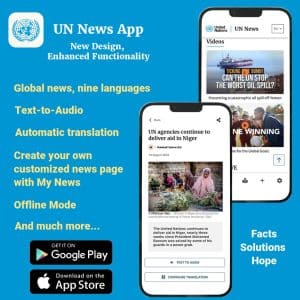
https://news.un.org/en/content/un-news-go
Video: https://media.un.org/en/asset/k12/k122wcui90
Discover the revamped UN News App – your gateway to authentic UN multimedia content. Dive deep into the world of the United Nations with this all-new UN News App. Experience reliable and verified information direct from the UN, now at your fingertips. From in-depth stories to live broadcasts of key UN meetings, get everything in a sleek design with enhanced functionalities. Original content in 9 languages and option to auto-translate, and a tailored newsfeed.
Economic Growth and Sustainable Development
Assessment report on Invasive Alien Species and their Control (IPBES)
https://www.ipbes.net/IASmediarelease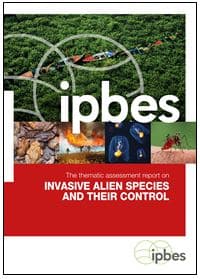
The severe global threat posed by invasive alien species is underappreciated, underestimated, and often unacknowledged. According to a major new report by the Intergovernmental Platform on Biodiversity and Ecosystem Services (IPBES), more than 37,000 alien species have been introduced by many human activities to regions and biomes around the world. This conservative estimate is now rising at unprecedented rates. More than 3,500 of these are harmful invasive alien species – seriously threatening nature, nature’s contributions to people and good quality of life. Too often ignored until it is too late, invasive alien species are a significant challenge to people in all regions and in every country. Approved on 2 September 2023 in Bonn, Germany, by representatives of the 143 member States of IPBES, the report finds that alongside dramatic changes to biodiversity and ecosystems, the global economic cost of invasive alien species exceeded $423 billion annually in 2019, with costs having at least quadrupled every decade since 1970.
Accelerating the SDGs through Digital Public Infrastructure: A Compendium of the Potential of Digital Public Infrastructure (UNDP)
https://www.undp.org/publications/accelerating-sdgs-through-digital-public-infrastructure-compendium-potential-digital-public-infrastructure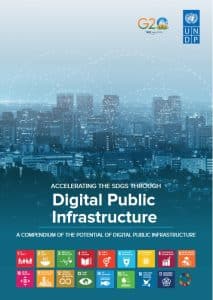
The world is approaching the midpoint implementation of the 2030 Agenda for Sustainable Development, but only 12% of the targets are on track. Digital public infrastructure (DPI) has emerged as a critical enabler of digital transformation and can turbocharge progress to deliver on the SDGs. But to do so, it is paramount to understand where DPI has had success and where potentials exist in order to best leverage learnings and experiences on a global scale. This compendium presents a snapshot of digital solutions in action around the world that can help move the needle and get us back on track. Mapped across all 17 SDGs, the solutions include a mix of mature DPI and others that could potentially become ones, all sharing the common characteristics of interoperability, open standards, societal scale, and robust enabling rules and regulations. With a whole-of-society approach for driving DPI in mind, this compendium is designed as a first of its kind knowledge resource and guide that decision-makers and practitioners in government, international development, private sector, or civil society can use to inform their efforts towards accelerating SDGs through DPI. This compendium and a complementary playbook on DPI were released as part of India’s G20 Presidency to help countries advance their digital transformation journey.
The DPI Approach: A Playbook (UNDP)
https://www.undp.org/publications/dpi-approach-playbook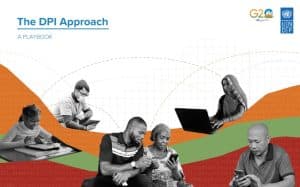
Digital public infrastructure (DPI) has gained momentum globally. It is a potential game-changer that can help countries achieve their national development priorities. For countries in the early stage of their DPI adoption journey, or may be just beginning to embrace this novel concept: where should they start? Beyond the definitions and principles, what are some practical steps they need to consider? This DPI playbook is designed as a practical and public resource that low and middle-income countries (LMICs) in particular can utilize in building an inclusive and rights-based DPI. Building on the common framework on DPI, insights from consultations with LMICs, coupled with the international experiences from countries leading in the DPI space, this playbook provides a first of its kind blueprint that can help countries kickstart their journeys with respect to the technology, governance and community components of DPI. Key features include checklists and assessment tools with case studies and best practices to guide government officials across ministries and agencies on how to go about designing and implementing DPI. This playbook and a complementary compendium on DPI were released as part of India’s G20 Presidency to help countries advance their digital transformation journey.
Climate Change Displacement and the Right to Education in Small Island Developing States (UNU-IAS Policy Brief)
https://ias.unu.edu/en/news/news/policy-brief-informs-resilient-education-in-sids-facing-climate-displacement.html
This new policy brief, issued by the United Nations University, Institute for the Advanced Study of Sustainability (UNU-IAS) offers guidance on building resilient education systems in small island developing states (SIDS) to meet the needs of people displaced by climate change. Considering the unique challenges faced by SIDS, it puts forward practical recommendations to minimise learning disruption during extreme weather events and facilitate post-disaster recovery.
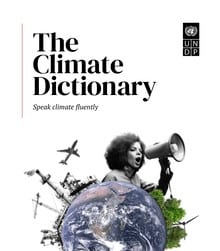
https://www.undp.org/publications/climate-dictionary
The Climate Dictionary is an initiative aimed at providing an everyday guide to understanding climate change. It seeks to bridge the gap between complex scientific jargon and the general public, making climate concepts accessible and relatable to individuals from various backgrounds and levels of expertise. The concept was driven by the belief that empowering people with knowledge is crucial in fostering action and collective responsibility towards addressing climate change. By utilizing a creative combination of compelling visuals, concise explanations, and engaging storytelling, “The Climate Dictionary” effectively communicated complex climate concepts in a user-friendly and visually captivating manner. The publication features a series of climate-related term or phenomenon. The content was meticulously crafted to cater to diverse audiences, catering to both the scientifically inclined and those with limited prior knowledge of the subject.
Generative AI and Jobs: A global analysis of potential effects on job quantity and quality (ILO Working Paper 96)
https://www.ilo.org/global/publications/working-papers/WCMS_890761/lang–en/index.htm
Generative Artificial Intelligence (AI) is more likely to augment than destroy jobs by automating some tasks rather than taking over a role entirely, a new study from the International Labour Organization (ILO) has found. It suggests that most jobs and industries are only partly exposed to automation and are more likely to be complemented rather than substituted by the latest wave of Generative AI, such as chatGPT. Therefore, the greatest impact of this technology is likely to not be job destruction but rather the potential changes to the quality of jobs, notably work intensity and autonomy. Clerical work was found to be the category with the greatest technological exposure, with nearly a quarter of tasks considered highly exposed and more than half of tasks having medium-level exposure. In other occupational groups – including managers, professionals and technicians – only a small share of tasks was found to be highly exposed, while about a quarter had medium exposure levels. The study, which is global in scope, documents notable differences in the effects on countries at different levels of development, linked to current economic structures and existing technological gaps. It finds that 5.5 per cent of total employment in high-income countries is potentially exposed to the automating effects of the technology, whereas in low-income countries, the risk of automation concerns only some 0.4 per cent of employment. On the other hand, the potential for augmentation is nearly equal across countries, suggesting that with the right policies in place, this new wave of technological transformation could offer important benefits for developing countries.
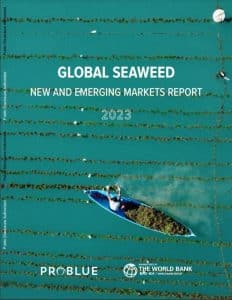
https://openknowledge.worldbank.org/handle/10986/40187
With its ability to sink carbon, sustain marine biodiversity, employ women, and unlock value chains, seaweed farming demonstrates how development, climate, and nature work together to generate value and uplift communities. Seaweed farming can help build a world free of poverty on a livable planet and has enormous growth potential. The “Global Seaweed New and Emerging Markets Report 2023” has identified ten global seaweed markets with the potential to grow by an additional USD 11.8 billion by 2030. Yet, much of the seaweed sector’s value remains untapped – it has clear growth potential beyond its current markets. Today, most farmed seaweed is used for direct human consumption, as fresh feed in aquaculture, or as hydrocolloids. However, seaweed-farmed products may be able to displace fossil fuels in sectors such as fabrics and plastics; can provide ecosystem services, such as carbon sequestration and nitrogen cycling; and can generate socioeconomic benefits in fragile coastal communities. Further, the market is currently dominated by a handful of Asian countries, which produce 98 percent of farmed seaweed by volume globally. Opportunities for growth in new regions and applications are high.
A guide to tailoring health programmes: using behavioural and cultural insights to tailor health policies, services and communications to the needs and circumstances of people and communities (WHO/Europe)
https://www.who.int/europe/publications/i/item/9789289058919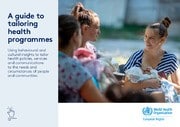
WHO/Europe has launched a new guide, providing support to countries on how to apply behavioural and cultural insights (BCI) for health. It presents a simple step-wise approach, complemented by a rich collection of detailed considerations, tools and exercises. The guide is the first of its kind, specifically developed for use by public health professionals developing policies, services and communications informed by BCI across health topics. Some of the most persistent public health challenges involve human behaviour. Using a BCI lens means that health policies, services and communications can be tailored to the needs and circumstances of people and communities, and thereby help combat these challenges. The new Tailoring Health Programmes (THP) guide describes how this can be done. Building on several topic-specific guides that focused on applying BCI to routine and influenza vaccination and tackling antimicrobial resistance, as well as external evaluations and a rigorous peer-review process, this guide is the result of over a decade of work by WHO/Europe. The THP approach has already been adopted in over 20 countries and has received positive feedback from public health agencies.
Healthier food and healthier food environments at sports events: an action guide for sports event organizers (WHO)
https://www.who.int/publications/i/item/9789240075436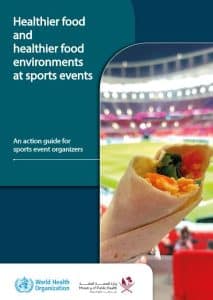
On 24 August 2023, the World Health Organization released a new action guide for sports event organizers, and healthier food and healthier food environments at sports events. The publication, developed in collaboration with the Ministry of Public Health, Qatar, is directed at sports event organizers. It proposes five actions to achieve healthier food and healthier food environments in and around sports stadia, from improving the food on offer to preventing harmful marketing. The action guide suggests activities that can be carried out during the planning, operational and post-event phases of sports events. The publication can also be used by governments, local authorities and sports stadia managers to create healthy public food procurement and service policies for sport settings more generally. Healthy, safe and sustainable diets are important for both human and planetary health, and sports events ought to be an ideal setting to model and promote healthy eating as part of a healthy lifestyle. The high visibility of sports mega-events offers valuable opportunities for potentially larger impacts that reach billions of fans worldwide, creating positive perceptions of healthier foods and beverages.
Towards peace, decent work, and greater equality: Research evidence for transforming economies, states, and societies (UNU–WIDER)
https://www.wider.unu.edu/publication/towards-peace-decent-work-and-greater-equality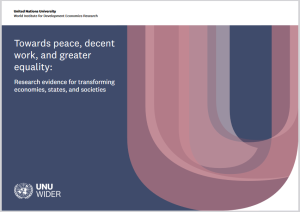
As we cross the mid-point of the 2030 Agenda for Sustainable Development, the United Nations University World Institute for Development Economics Research (UNU–WIDER) culminates a 5-year research programme on Transforming economies, states, and societies. The synthesis of the most salient research contributions made is organized in this report by three universal aspirations, shared by humans everywhere. These critical outcomes—peace, greater equality, and decent work—can be achieved in our lifetimes and are instrumental to accelerating progress on the Sustainable Development Goals (SDGs). Progress on the SDGs is now stalled following the emergence of a global threat no one predicted, COVID-19 and the crisis it precipitated. That, combined with the several endemic crises related to violent conflict, poverty, climate change, and political injustice—and the aftershocks of the Russian invasion of Ukraine which threaten food security worldwide—have reversed much of what has been achieved. Our findings provide clear opportunities for action, which can be a springboard for Southern governments and the international community hoping to recover and accelerate progress towards the SDGs. Encapsulating the key messages from 30 distinct research projects and distilling evidence from several hundred of UNU-WIDER’s recent studies, this report offers readers the latest insights on a broad range of important topics including: building peace in conflict-affected situations, increasing aid effectiveness and the resilience of democracy, strengthening the social contract, advancing social protection policy, increasing fiscal space, addressing inequalities, and tackling the challenges of informality and the impediments to decent work for all. Several of these findings relate to country-level studies covering Global South countries in every major world region and narrow major gaps in our knowledge on critical issues in these contexts.
Report of the high-level political forum on sustainable development convened under the auspices of the Economic and Social Council at its 2023 session (E/HLPF/2023/8, 3 August 2023)
English, French & Spanish: https://undocs.org/E/HLPF/2023/8
“Summary: Countries have been severely affected by interlocking crises that have amplified pressing challenges, including those relating to poverty, food insecurity, inflation, debt and energy. As a consequence, they have fallen further behind in achieving the Sustainable Development Goals in the face of these recent challenges. Despite the setbacks, they remain essential and collective efforts therefore need to be strengthened to achieve the 2030 Agenda for Sustainable Development. The 2030 Agenda remains the common road map for sustainable development.”
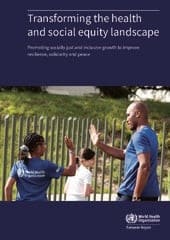
https://www.who.int/europe/publications/i/item/WHO-EURO-2023-7761-47529-69924
A hard-hitting report published on 12 July 2023 by WHO/Europe reveals a marked decline in trust across the WHO European Region between people and institutions, including governments, threatening pan-European solidarity. “Transforming the health and social equity landscape: promoting socially just and inclusive growth to improve resilience” plots the inextricable links between widening health and social inequities, the ever-increasing number of people living insecure lives, and the associated significant reductions in trust. Coordinated by the WHO European Office for Investment for Health and Development in consultation with key United Nations and other global agencies, the groundbreaking analysis highlights that when people do not feel the benefit of government policies – including those that protect health – yet see others benefitting, they increasingly turn away from government and other public entities and institutions. The report also offers a range of measures and solutions to address this challenge.
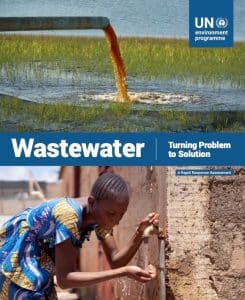
https://www.unep.org/resources/report/wastewater-turning-problem-solution
Wastewater is a growing health and environmental threat, accounting for almost as many planet warming emissions as the aviation industry. Yet, with the right policies, wastewater could be an invaluable resource, providing alternative energy to half a billion people, supplying over 10 times the water provided by current global desalination capacity and offsetting over 10 per cent of global fertilizer use. More than 10 years have passed since the release of the report ‘Sick Water? The Central Role of Wastewater Management in Sustainable Development‘, and despite some progress, significant amounts of wastewater are still being released untreated into the environment with negative repercussions for the environment and human livelihood. This new report, “Wastewater – Turning problem to solution” urges decision makers and action takers from all regions of the world to implement the three key actions, to overcome some or all seven barriers, and to put in place all or some of the six building blocks, described in the publication.
World Heritage: a unique contribution to biodiversity conservation
https://unesdoc.unesco.org/ark:/48223/pf0000385392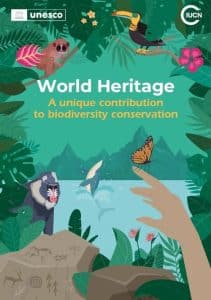
A UNESCO and IUCN assessment of the status of species reveals that UNESCO World Heritage sites harbour over 20% of mapped global species richness within just 1% of the Earth’s surface. Safeguarding these biodiversity hotspots is essential if the the Kunming – Montreal Global Biodiversity Framework is to be achieved. UNESCO is appealing to the 195 States Parties to the Convention to scale up investment in the conservation of their sites, and to nominate all remaining areas key to biodiversity conservation for World Heritage inscription. The UNESCO and IUCN first-time assessment of the status and trends of species reveals that UNESCO World Heritage sites make up less than 1% of the Earth’s surface, yet they harbour more than 20% of mapped global species richness, including more than 75,000 species of plants including trees and over 30,000 species of mammals, birds, fishes, reptiles and amphibians. These sites serve as formidable natural observatories for advancing scientific knowledge thanks to the concentration of over half of all mammals, birds and hard corals species in the world. They are also an endless source of inspiration for new environmental protection initiatives.
World Small Hydropower Development Report 2022 (UNIDO)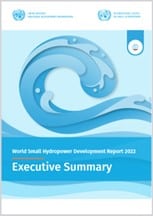
https://www.unido.org/WSHPDR2022
The World Small Hydropower Development Report (WSHPDR) 2022 is the result of an enormous collaborative effort between the United Nations Industrial Development Organization, the International Center on Small Hydro Power and over 200 local and regional small hydropower (SHP) experts, organizations, engineers, academics and government officials from across the globe. WSHPDR is a comprehensive reference publication for decision-makers, stakeholders and potential investors, which aims to promote small hydropower as a renewable and rural energy source for sustainable development. The report 2022 greatly expands on the first three editions (2013, 2016, 2019) by providing improvements in data accuracy with enhanced analysis and a more comprehensive overview of the sector by country. Despite the appeal and benefits of small hydropower solutions, much of the world’s SHP potential remains untapped (64 per cent). The global installed SHP capacity for plants of up to 10 MW is estimated at 79 GW according to the WSHPDR 2022, an increase of 1 per cent compared to data from the WSHPDR 2019.
World Statistics Pocketbook 2023
https://unstats.un.org/UNSDWebsite/Publications/StatisticalPocketbook/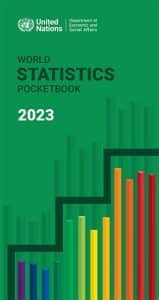
The World Statistics Pocketbook 2023 edition (Series V, No. 47) is the forty-seventh in a series of annual compilations of key statistical indicators prepared by the United Nations Statistics Division of the Department of Economic and Social Affairs. Up to 50 indicators from more than 20 international statistical sources are presented in one-page profiles for 30 world geographical regions and over 200 countries or areas of the world.
The Pocketbook profiles are organised into 5 sections; general information, economic indicators, major trading partners, social indicators, and environmental and infrastructure indicators. This issue presents data for the economic, social, environmental and infrastructure sections generally for three reference years ‐ 2010, 2015 and 2023 ‐ when available, or the most recent data previous to these years, back to 2000. For the general information and major trading partners sections the reference year is 2023 and 2022 respectively, unless otherwise footnoted. The indicators in the profiles cover the following topics: communication, crime, development assistance, education, energy, environment, finance, gender, health, international tourism, international trade, labour market, national accounts, population and migration, price and production indices and science and technology.
International Peace and Security
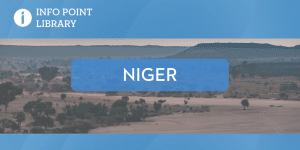
UNRIC Library Backgrounder: Niger
English: https://unric.org/en/unric-library-backgrounder-niger/
French: https://unric.org/fr/ressources/informations-par-theme-et-par-pays/
This new backgrounder provides an overview of available websites of the UN system, selected statements by UN officials and links to other information available online.
Development of Africa
Economic Development in Africa Report 2023 (UNCTAD)
Report in English, Executive Summary in English & French:
https://unctad.org/publication/economic-development-africa-report-2023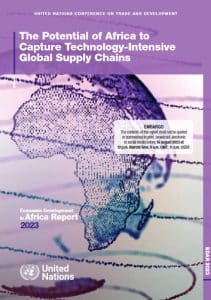
African economies can become major participants in global supply chains by harnessing their vast resources of materials needed by high-technology sectors and their own growing consumer markets, the United Nations Conference on Trade and Development (UNCTAD) said in its “Economic Development in Africa Report 2023” launched on 16 August 2023 in Nairobi. Supply chains encompass the systems and resources needed to develop, produce and transport goods and services from suppliers to customers. Africa’s abundance of critical minerals and metals, including aluminum, cobalt, copper, lithium and manganese, vital components in technology-intensive industries, positions the continent as an attractive destination for manufacturing, as recent upheavals caused by trade turbulence, geopolitical events and economic uncertainty compel manufacturers to diversify their production locations. Africa also offers advantages such as shorter and simpler access to primary inputs, a younger, technology-aware, and adaptable labour force and a burgeoning middle class, known for its growing demand for more sophisticated goods and services.
Human Rights
A barrier to securing peace: Human rights violations against former government officials and former armed force members in Afghanistan: 15 August 2021 – 30 June 2023 (UNAMI)
https://unama.unmissions.org/impunity-prevails-human-rights-violations-against-former-government-officials-and-armed-force
The United Nations Assistance Mission in Afghanistan (UNAMA) has recorded credible reports of serious human rights violations by the de facto Taliban authorities against hundreds of former government officials and former armed forces members. A UNAMA report released on 22 August 2023, covering the period from the Taliban takeover of Afghanistan on 15 August 2021 to 30 June 2023, documented at least 800 instances of extrajudicial killing, arbitrary arrest and detention, torture and ill-treatment and enforced disappearance carried out against individuals affiliated with the former government of the Islamic Republic of Afghanistan and its security forces. This is despite the announcement by the de facto authorities of a “general amnesty” for former government officials and former members of the Afghan National Defense and Security Forces (ANDSF).
General comment No. 26 (2023) on children’s rights and the environment with a special focus on climate change
https://www.ohchr.org/en/documents/general-comments-and-recommendations/general-comment-no-26-2023-childrens-rights-and
In this general comment, the Committee emphasizes the urgent need to address the adverse effects of environmental degradation, with a special focus on climate change, on the enjoyment of children’s rights, and clarifies the obligations of States to address environmental harm and climate change. The Committee also explains how children’s rights under the Convention on the Rights of the Child apply to environmental protection, and confirms that children have a right to a clean, healthy and sustainable environment.
A child-friendly version will be available on 18 September 2023.
Online Scam Operations and Trafficking Into Forced Criminality in Southeast Asia: Recommendations for a Human Rights Response
https://bangkok.ohchr.org/online-scam-and-trafficking-sea/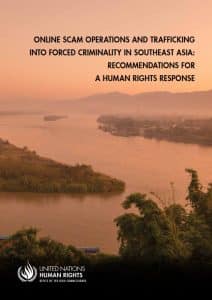
Hundreds of thousands of people are being forcibly engaged by organised criminal gangs into online criminality in Southeast Asia – from romance-investment scams and crypto fraud to illegal gambling – this report issued on 29 August 2023 by the UN Human Rights Office shows. Victims face a range of serious violations and abuses, including threats to their safety and security; and many have been subjected to torture and cruel, inhuman and degrading treatment or punishment, arbitrary detention, sexual violence, forced labour, and other human rights abuses, the report says. The enormity of online scam trafficking in Southeast Asia is difficult to estimate, the reports says, because of the clandestine nature and gaps in the official response. Credible sources indicate that at least 120,000 people across Myanmar may be held in situations where they are forced to carry out online scams, with estimates in Cambodia similarly at around 100,000. Other States in the region, including Lao PDR, the Philippines and Thailand, have also been identified as main countries of destination or transit where at least tens of thousands of people have been involved.
Report of the Special Rapporteur on the situation of human rights defenders – Pathways to peace: women human rights defenders in conflict, post-conflict and crisis-affected settings (A/78/131, 7 July 2023)
English, French & Spanish: https://undocs.org/A/78/131
“Summary: In the present report, the Special Rapporteur on the situation of human rights defenders, Mary Lawlor, analyses the situation of women human rights defenders working in conflict, post-conflict and crisis-affected settings and highlights their contributions to peace and security, despite the often difficult and even hostile environments in which they work. The report contains examples of individual cases of women human rights defenders working in these contexts, as well as recommendations to States and other relevant stakeholders on providing a safe and enabling environment in which to carry out their legitimate human rights work.”
Humanitarian Affairs
The impact of travel to Ukraine on refugees’ legal status and access to rights in host countries (UNHCR)
https://data.unhcr.org/en/documents/details/102804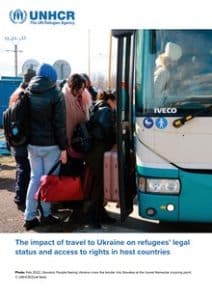
The war in Ukraine has precipitated one of the largest displacement crises in the world, with approximately 5.9 million refugees recorded in Europe alone to date. The implementation of the Temporary Protection Directive (TPD) in the European Union and similar legal schemes elsewhere has enabled millions of refugees from Ukraine to access protection and rights in host countries. As illustrated through UNHCR’s intentions surveys, the majority of refugees from Ukraine hope to return to Ukraine one day. The ongoing international armed conflict and associated safety and security concerns prevent most from permanently returning home at the current time, although there are signs of permanent returns having taken place back to Ukraine. Many refugees have temporarily returned to Ukraine since their arrival in host countries, primarily to visit family members from whom they have been separated because of the war and to obtain documentation. As noted in UNHCR’s position on voluntary return to Ukraine, the ability of refugees to travel home for short periods can help pave the way for more durable returns in the future once conditions permit. UNHCR’s intentions surveys support this view, with respondents who have been able to conduct a temporary visit to Ukraine more likely to report plans to return permanently in the future. This report aims to shed light on the impact of travel to Ukraine on refugees’ legal status and access to rights in 38 host countries in Europe. The research demonstrates widely varying approaches between host countries towards refugees who travel back to Ukraine with significant differences in the consequences for access to legal status and associated rights.
Justice and International Law
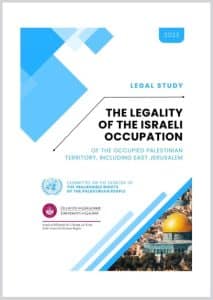
Legal Study on the legality of the Israeli occupation of the Occupied Palestinian Territory, including East Jerusalem
https://www.un.org/unispal/document/ceirpp-legal-study2023/
The Committee on the Exercise of the Inalienable Rights of the Palestinian People has launched a legal study on the legality of the Israeli occupation of the Occupied Palestinian Territory, including East Jerusalem. The Study aims to contribute to a broader understanding of the complex legal frameworks surrounding the Israeli occupation and its implications. It has been commissioned by the Committee and prepared independently by the Irish Human Rights Centre of the National University of Ireland in Galway.
TREATY EVENT 2023: Towards Universal Participation in Multilateral Environmental Agreements for a Healthy Planet: (19 – 22 September 2023, United Nations Headquarters)
English: https://treaties.un.org/Pages/TreatyEvents.aspx?path=Treaty/Focus/Page1_en.xml
French: https://treaties.un.org/Pages/TreatyEvents.aspx?path=Treaty/Focus/Page1_fr.xml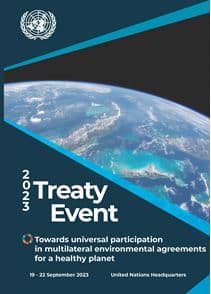
The concept and practice of the annual Treaty Events take root in the Secretary-General’s Millennium report (A/54/2000) to the General Assembly where he stated the need to provide “special facilities for the Heads of States or Government to add their signatures to any treaty or convention of which the Secretary-General is the depositary”. Ever since, all necessary facilities have been provided for the purpose during the General Debate of each session of the General Assembly, and the Heads of State or Government or Foreign Ministers or other duly authorised state representatives have made use of this unique opportunity to express support for the multilateral treaty framework and the rule of law. As envisioned years ago, the successive treaty events inspired a renewed enthusiasm for participation in these treaties by a growing majority of States. By signing multilateral conventions or depositing their instruments of ratification, accession or through other instruments establishing the consent to be bound, the Member States contribute significantly to the advancement of the rule of law in international relations and the cause of peace.
Drug Control, Crime Prevention and Counter-terrorism
Guide for Policymakers for the Use of Sport for the Prevention of Violent Extremism
https://unicri.it/Publication/Guide-Policymakers-Use-Sport-Prevention-Violent-Extremism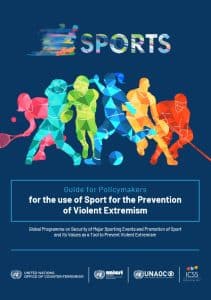
The Guide has been designed by the United Nations Office of Counter-Terrorism (UNOCT), the United Nations Alliance of Civilizations (UNAOC), the United Nations Interregional Crime and Justice Research Institute (UNICRI) and the International Centre for Sport Security (ICSS) within the framework of the Global Programme on Security of Major Sporting Events and Promotion of Sport and Its Values as a Tool to Prevent Violent Extremism (PVE). Sport is universally recognized as a way to promote diversity, respect, tolerance and other values that support positive relationships between people, regardless of faith, race or culture. Beyond its capacity to unite people at local, national, and global levels, sport is increasingly used as a vehicle to empower women and men of all ages; to improve well-being and health, support education and social development objectives; and to strengthen the resilience of individuals and communities. Around the globe, the power of sport is being harnessed to support agendas for peace, development, and more frequently to PVE. This Guide has been developed as part of the multi-year Global Sport Programme. The key objectives of the Programme are: – To increase Member States’ awareness of terrorism-related threats against vulnerable targets in the context of major sporting events (MSEs) and their ability to protect them as a common good of humanity; – To promote sport and its values to build resilience to violent extremism, especially among youth; – To support Member States to integrate sport-based initiatives within national action plans for PVE.
Newsletter Archive: https://unric.org/en/unric-info-point-library-newsletter-archive
Credit:Source link




